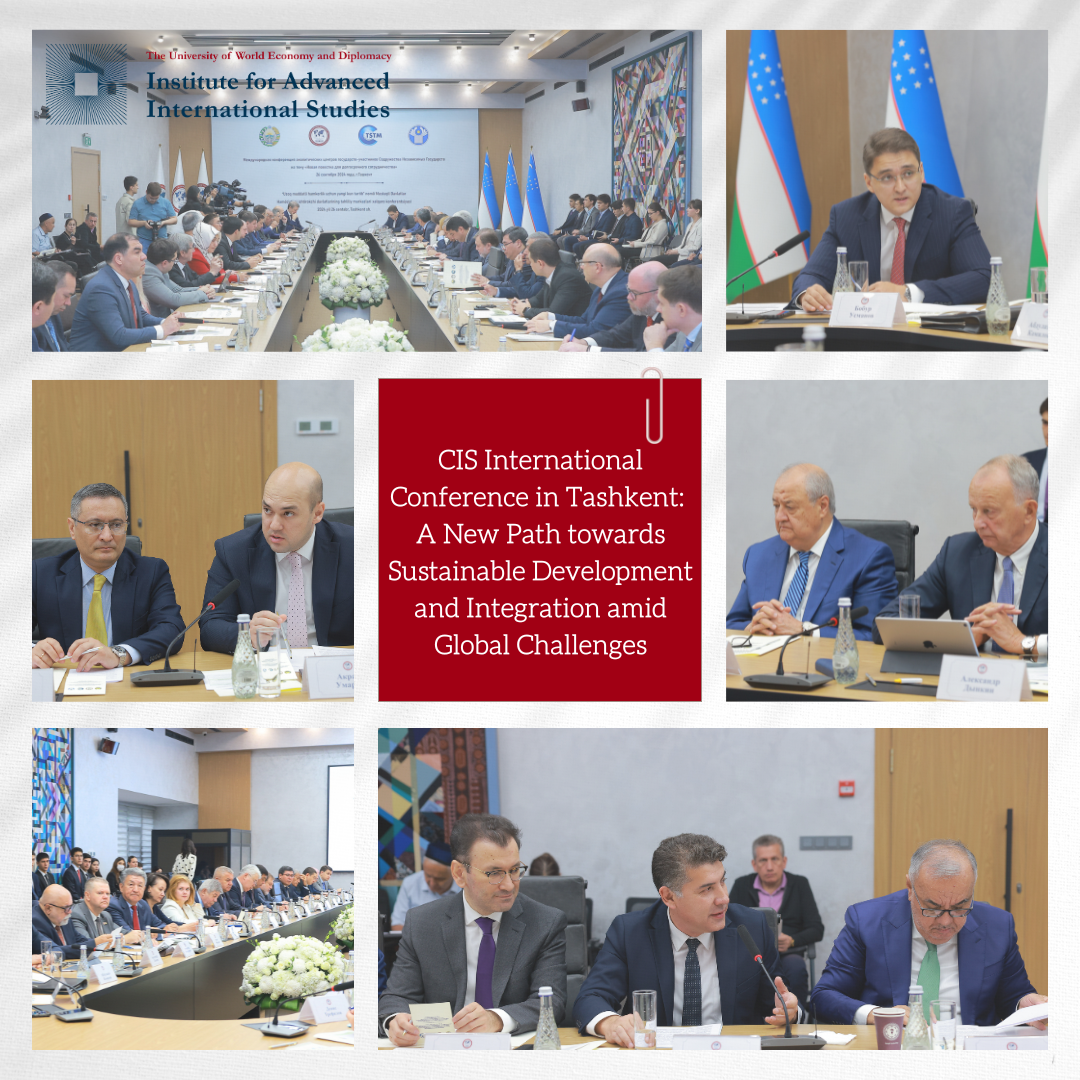
On 26 September this year, the University of World Economy and Diplomacy (UWED) hosted the International Conference of Analytical Centres of the Commonwealth of Independent States (CIS), titled “A New Agenda for Long-Term Cooperation”. The event aimed at analysing processes within the CIS member states, exploring prospects and untapped opportunities, as well as assessing potential risks to sustainable development. It brought together leading representatives of the academic and expert community, alongside officials from CIS member states.
The official opening ceremony, moderated by Sanjar Valiev, Director of the Centre for Foreign Policy Studies and International Initiatives at the Ministry of Foreign Affairs of Uzbekistan, began with a welcoming address from Sergey Lebedev, Secretary-General of the CIS, delivered via video message. In his speech, Mr Lebedev emphasised the importance of strengthening dialogue amid new geopolitical realities. Bobur Usmanov, Deputy Foreign Minister of Uzbekistan, and Akram Umarov, First Vice-Rector of UWED, in their addresses, highlighted Uzbekistan’s pivotal role in shaping the new CIS agenda, which is centred on sustainable development and enhancing economic and political integration.
Dr Sherzod Abdullaev, Director of the Institute for Advanced International Studies (IAIS) at UWED, outlined three key factors of global change: political tension, the resurgence of competition between ideological narratives, and technological transformations. He expressed interest in the opinions of the attending experts, setting the tone for the First session, which he moderated. The discussions delved into key issues of security, geopolitics, and the prospects for expanding dialogue and cooperation among CIS countries in the face of a changing world order.
The Second session, focused on economic cooperation and the “green” transition, saw participants thoroughly explore industrial cooperation, trade, transport, energy, and food security across the CIS region. It was underscored that the region’s economic stability is closely linked to deepening integration processes among CIS member states, particularly in the context of adopting innovative and sustainable approaches. The experts emphasised that the successful future of the region is inherently tied to the transition to low-carbon economies and an increase in investment in renewable energy sources.
The Third session, dedicated to cultural and humanitarian cooperation, discussed ways to strengthen collaboration in the fields of science, education, and culture. A key element of the discussions was the preservation of the region’s shared heritage and the promotion of humanitarian projects aimed at bringing CIS nations closer together. Science and education were also highlighted as critical areas for collaboration, as they provide the foundation for long-term cooperation among CIS countries. The participants underscored the importance of academic exchanges, joint research projects, and the development of common educational programmes and curricula. Establishing joint educational centres and research institutes that could attract students and scholars from all CIS countries was seen as a crucial step towards integrating the scientific potential of the region.
In the concluding part of the event, Sanjar Valiev presented the newly established Centre for Foreign Policy Studies and International Initiatives at the Ministry of Foreign Affairs of Uzbekistan. Mr Valiev outlined the Centre’s primary goals and its contribution to the advancement of foreign policy research. One of the conference’s key outcomes was the signing of Memorandums of Cooperation between the Centre and the Belarusian Institute for Strategic Studies, as well as the Institute for Foreign Policy Studies under the Ministry of Foreign Affairs of the Republic of Kazakhstan. These agreements will serve as a foundation for further collaboration in the field of foreign policy and international initiatives.
Thus, the conference demonstrated the strong commitment of CIS member states to jointly addressing the evolving geopolitical dynamics. In the face of global instability, the event highlighted the need for deepening dialogue among CIS countries, fostering mutual trust, and developing coordinated approaches to tackling both regional and international challenges. Such collaboration will ensure a continuous exchange of experience and expert knowledge, enabling CIS states to effectively adapt to new challenges and seize emerging opportunities for their long-term development.